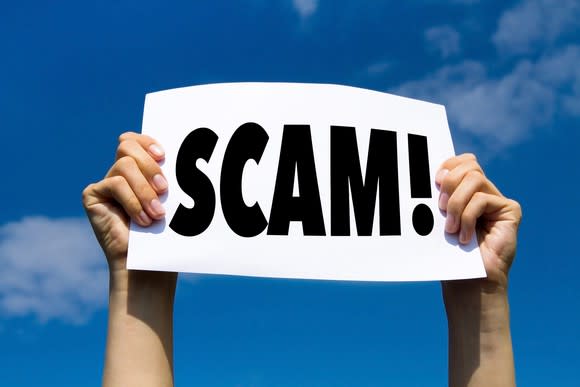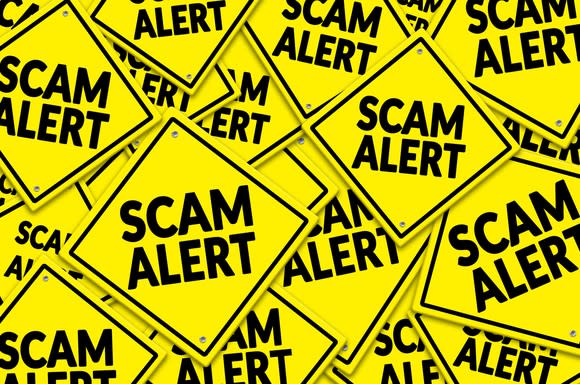Watch Your Wallet -- Avoid These 3 Money Scams
It's hard enough to earn our dollars, so the last thing we need or want is to have some of them stolen from us via one scam or another -- and there are a heck of a lot of scams out there.
Here's a review of three scams that could hurt you in three different parts of your financial life: taxes, health insurance, and online shopping. Get acquainted with them so that you won't fall victim to them.

Image source: Getty Images.
Tax scam: Fraudulent tax returns
The first scam to know about is going to be widespread in the next few months, because it relates to our taxes. It involves criminals filing tax returns in other people's names in order to claim and collect tax refunds.
A first step toward conducting this fraud is for the scammers to get your identifying information, such as your Social Security number and your address. There are various ways that scammers try to get this info, and a common one is simply calling you and asking you for it. If you're laughing and thinking that's silly, know that it works a lot, because the scammers are likely to claim that they're from the Social Security Administration (SAA) or perhaps the IRS. They'll be convincing, too, sometimes with your phone's caller ID feature cooperating, saying that a call is from the SAA or IRS.
The caller will explain that there's a problem -- possibly that someone has used your identity fraudulently (which, ironically, is just what they want to do). To clear it up, they'll want you to verify your Social Security number and other information. If you're reluctant, they may scare you into it, suggesting that you may have to go to court or that your Social Security number or your benefits may be canceled or some other terrible thing.
Here's what you need to know:
The Social Security Administration (and many other agencies and companies) will never call you asking for such information.
Caller ID is not always accurate. Scammers can employ fake numbers with fake identities.
Never give out your Social Security number or any other personal information to any stranger on the phone unless you're very sure who they are.
If you're in doubt, call the Social Security Administration yourself. You can call them at 1-800-772-1213 (TTY 1-800-325-0778).
It's also smart to set up a my Social Security account with the SSA. Once you do, you'll be able to see the SSA's record of your earnings for your entire working life, as well as estimates of your future benefits. It can also prevent your falling victim to a scam, as some identity thieves are pretending to be various people, setting up my Social Security accounts for them, and then trying to steal their Social Security benefits or causing other headaches. To minimize hassles, set up your account before a scammer does so for you.

Image source: Getty Images.
Health insurance scam: Being sold a terrible policy
Next up is the field of health insurance. We all should, ideally, carry health insurance, and if you buy coverage through your state's health insurance exchange, you should be able to clearly see what coverage you're getting for your money. Thanks to the Affordable Care Act, there have been certain minimum levels of coverage required, though efforts are underway in Washington to change that. Many people of modest means will find that they qualify for subsidies to help make policies affordable, too.
Still, you may be pitched on some healthcare coverage that's much less costly than you're paying or think you would pay elsewhere, often by someone going door to door or through a television commercial or mailed advertisement. It can be tempting, but these plans are often phony -- or, at most, cover very little or just offer some modest discounts on some out-of-pocket expenses. They're no substitute for robust, full-featured coverage. You may not even find out that a plan you buy is garbage until you're faced with some big bills that the policy doesn't cover.
Here's what to look out for:
Pushy salespeople: These bad "policies" are typically pushed upon people over the phone, in person, or through email. You're often told that it's urgent that you act now, as the deal will soon not be available.
Just like in the tax scam, the scammer may pretend to be from the government, a well-known insurance company, or some other entity you're likely to trust.
Just a phone number: Instead of offering lots of information and ways to contact the company, you'll often be given just a phone number.
Personal information: You'll often be asked for personal financial information, such as your bank account number or credit card number.
Joining the club: You may be told that you'll have to join a union or association to qualify for this great coverage. Look into that organization if you can. You should be provided with its name, street address (not a post office box), website, and more.
Here are some actions you can take if faced with the possibility of this health insurance scam:
Hang up: Just don't engage with the salesperson. Ignore it all.
Ask for the information in writing. Have them mail you all the details of the coverage -- and then read it (if you receive it). If you do receive literature and it looks all right, that's still not good enough. Check with your state insurance agency that oversees insurance provided in your area. Chances are, they can tell you if you've got a scam on your hands.
If the salesperson says they're representing a real insurance company, contact the company on your own to see if they really offer such a plan.
A good thing to remember is that if you're being pitched something that seems too good to be true, it probably is. Don't take chances with your health -- or your money.

Image source: Getty Images.
Online shopping scam: Fake retailers
That same bottom line -- not believing anything too good to be true -- applies to online shopping as well. There, too, you'll find scammers looking for victims. You might be facing a scam if you run across a simply amazing price for something you want to buy -- or if you find something that seems completely out of stock or unavailable elsewhere. When you try to buy it, it may never arrive, or what you receive may not be exactly what was advertised. And if you try to get a refund or replacement, your requests may fall on deaf ears.
The best way to avoid being scammed like that is to stick with major, well-known retailers. They're not going to be shady fly-by-night operations, and they'll have clearly articulated policies for dealing with problems and returns.
Still, not all small retailers are bad. Here are some ways that you can protect yourself if you're thinking of buying from a new-to-you retailer:
Do some research into the retailer. Look it up at the Better Business Bureau to see if there have been any or many grievances lodged about it. You can also check to see if it carries any seals of approval, such as the Better Business Bureau seal, the Norton Secured Seal, the McAfee Secured seal, or the TRUSTe Certified seal. (It's possible that a seal may be fraudulently displayed, though, so don't put too much stock in this alone. Remember, too, that various seals are attesting to different factors, such as the site's security features or its business record.)
Dig deeper if you can. You can look up the website to see who it belongs to and when it was registered. Looking up Amazon.com, for example, reveals that it's 8,841 days old (going back to October of 1994) and that the registrant is Amazon's legal department. Try looking the retailer up via a search engine, too, to see if you find people praising or griping about it.
Before buying anything, make sure you see that the site's URL has an "s" (for "secure") after the "http." There's no guarantee that the site offers as much security as you need (and many big-name companies have had their security compromised), but you should not proceed without that "s." Also make sure that the company's name or URL isn't too close to that of a known retailer. If they are, the company may be hoping you'll think it's the known retailer. Some, for example, might go by the name Norstrom's or JC Penny or BestBye. You get the idea.
Look for other clues on the retailer's website that suggest it's not professional. If you see poor writing, misspellings, and bad grammar, that's a bad sign. If there's no contact information showing a specific address where the company is based and how you can contact it, that's not promising, either. (Once you know where it's based, you may be able to look it up with the secretary of state there to see if it has a good or bad record.) If there's a phone number, try calling it to see who answers and how professional they seem.
Beware if you can't pay with a credit or debit card and instead you're required to wire money or pay with a prepaid gift card or cash. Such payment methods mean you may not be able to get your money back if you need to. Look up refund and return policies, too.
If you're tempted by a very low price, try taking it to another, more known retailer that matches or beats competitors' prices. If the known seller won't accept the low price you found, that could be because the unknown one is not a legitimate competitor.
Finally, if you fall victim to a shady e-commerce retailer, report the incident. You can file complaints with the Better Business Bureau, the Federal Trade Commission, and your state attorney general and/or secretary of state.
There are lots of scams out there. You can minimize your chance of being victimized by always being at least a little doubting, by doing research before purchasing things -- including health insurance -- from unknown sellers, and by never sharing your personal information with strangers you don't trust.
More From The Motley Fool
John Mackey, CEO of Whole Foods Market, an Amazon subsidiary, is a member of The Motley Fool's board of directors. Selena Maranjian owns shares of Amazon. The Motley Fool owns shares of and recommends Amazon. The Motley Fool has a disclosure policy.

 Yahoo Finance
Yahoo Finance 